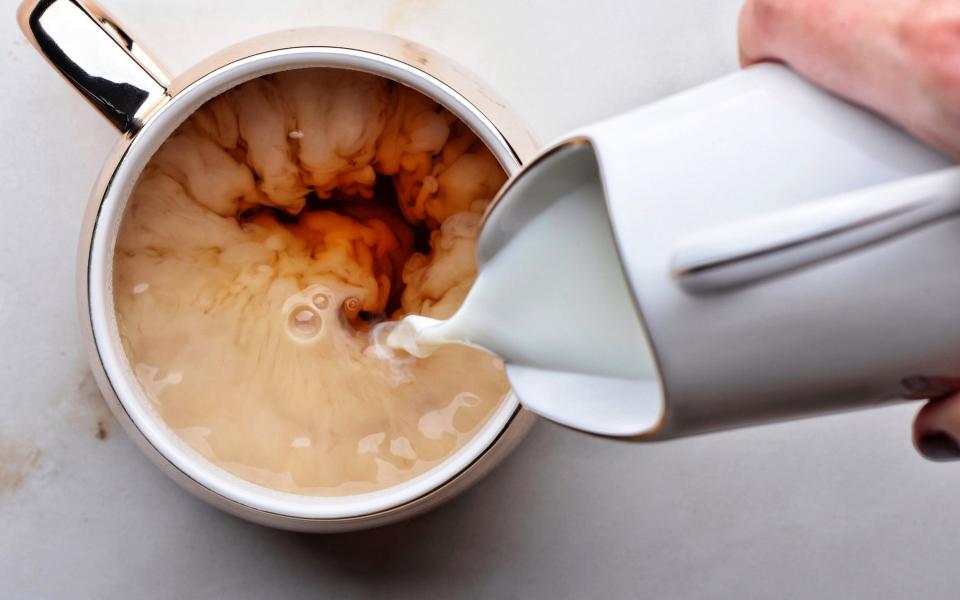Put milk in hot drinks to protect against cancer, warn experts

Adding cold milk to tea and coffee, or waiting for hot drinks to cool down, could protect against oesophageal cancer, a new study suggests.
Research has found that regularly swallowing hot drinks nearly doubles the risk of developing disease of the gullet and researchers have advised people to allow beverages to cool.
In 2016, the World Health Organisation (WHO) first warned of the cancer risk associated with drinks above 65C.
Now a study of 50,000 people by the American Cancer Society has found found that drinking 700ml per day of tea (around three cups) at 60C or higher was ‘consistently associated’ with a 90 per cent increased risk of the disease, compared with people who consumed drinks at lower temperature.
During the 13 year follow-up period from 2004 to 2017, 317 new cases of oesophageal cancer - also known as cancer of the food pipe - were identified, and the chance of developing the disease was far higher for people consuming hot drinks.

Lead author Dr Farhad Islami, said: “Many people enjoy drinking tea, coffee, or other hot beverages.
“However, according to our report, drinking very hot tea can increase the risk of oesophageal cancer, and it is therefore advisable to wait until hot beverages cool down before drinking.”
The lifetime risk of getting oesophageal cancer in a man is 1 in 55, meaning that for every 550 men, 10 would get oesophageal cancer anyway.
The new research suggests that would rise to 19 out of 550 for men who drink very hot beverages.
The carcinogenic effect is likely to stem from repeated scalding of the food pipe which damages cells. Alcohol and smoking have a similar impact on cells and also cause oesophageal cancer.
Previous studies have found that smokers and drinkers who drink hot tea are more at risk of cancer of the gullet.
However the study was carried out on people living in Iran, where tea and coffee is drunk far hotter than in Britain. An article published in the journal Burns in 2016 found that a cup of tea with 10ml of milk cooled to less than 65C in under five minutes.
Allowing tea to cool to 60C is also unlikely to impact the taste according to research.
The Royal Society of Chemistry also recommends drinking tea at 60-65 degrees while Northumbria University found that the perfect drinking temperature of tea – 60C – is achieved six minutes after brewing begins.
Most coffee experts recommend that the drink be served between 40 and 60C (120 – 140F).
Georgina Hill, health information officer at Cancer Research UK, said: “This study adds to the evidence that having drinks hotter than 60 degrees may increase the risk of oesophageal cancer, but most people in the UK don't drink their tea at such high temperatures.
“As long you're letting your tea cool down a bit before you drink it, or adding cold milk, you're unlikely to be raising your cancer risk - and not smoking, keeping a healthy weight and cutting down on alcohol will do much more to stack the odds in your favour.”
In 1991 The International Agency for Research on Cancer (IARC) linked coffee to bladder cancer, but following the lengthy review, concluded there was little to suggest a danger.
More recent research has found that coffee drinking had no carcinogenic effects for cancers of the pancreas, female breast, and prostate.
Commenting on the new research Prof Andrew Sharrocks, Professor of Molecular Biology, University of Manchester, said: "There is a clear association between drinking very hot beverages (here defined above 65 degrees) and the chances of getting oesophageal squamous cell carcinoma.
"It is advisable therefore to allow drinks to cool before drinking them, although adding cold milk as is often the case in western societies would produce the same effect.
"Indeed, the incidence of this type of cancer is a lot lower in western countries, which may partly reflect these drinking habits."
The research was published in the Journal of Cancer.
